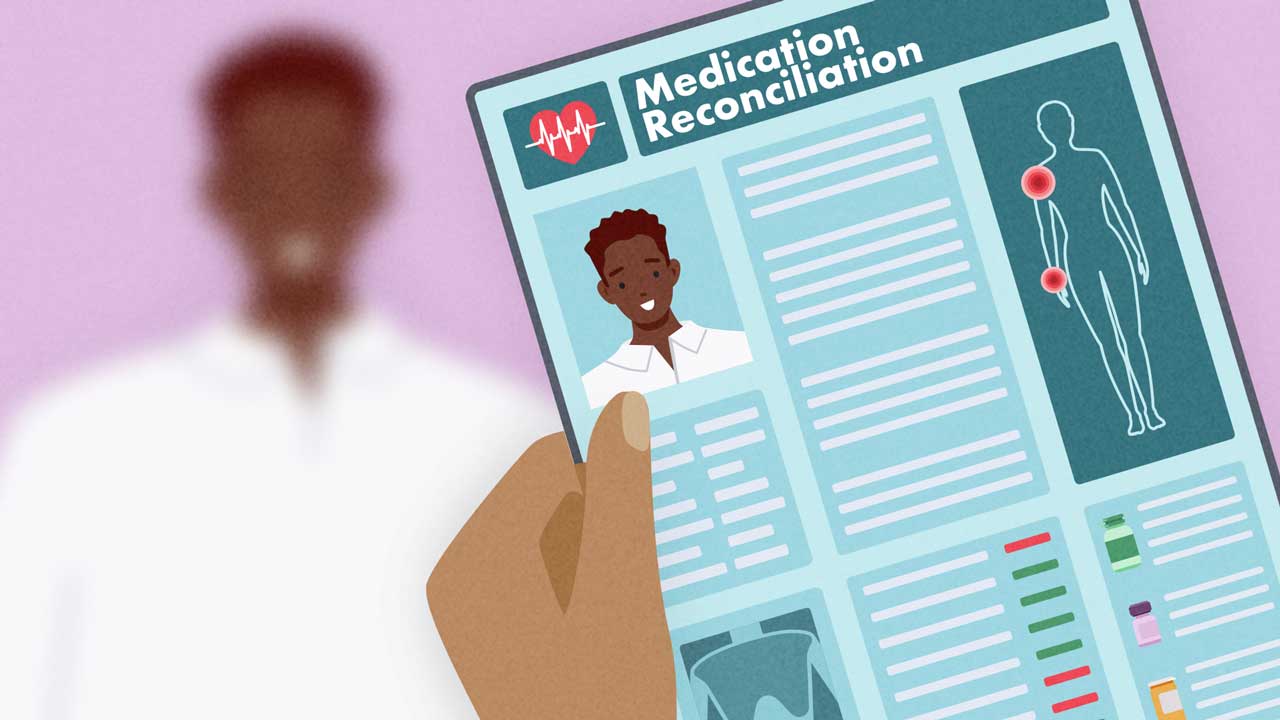Medication reconciliation is the formal process of reviewing a patient’s complete medication regimen at the time of admission, transfer and discharge, and comparing it with the regimen being considered for a new care environment (PSNet 2019).
In essence, medication reconciliation aligns the correct medication with the correct patient. It’s closely tied to the concept of maintaining continuity of care.
Medication reconciliation is particularly important in transitional points of care, such as during admission, transfer and discharge.

When a person is moved between care environments, such as wards, hospitals and their home, a current and accurate list of their medicines should be provided to the health professional or carer who will be taking over that person’s care (Vic DoH 2024).
Accidental changes to medicines often occur and for a vast range of reasons. For example, hospital staff may be unable to access a patient’s complete pre-admission medication list or could be unaware of very recent changes to their medication. Because of this, the new medication plan prescribed at discharge could accidentally exclude required medications, unnecessarily duplicate existing therapies, or list incorrect dosages (PSNet 2019).
These discrepancies make patients vulnerable to adverse drug events (ADEs) - one of the primary types of adverse events that occur following hospital discharge (PSNet 2019).
What Does Medication Reconciliation Look Like in Practice?
The following are integral to effective medication reconciliation:
- Collecting, verifying and recording a patient’s current prescriptions and over-the-counter medications. This encompasses medicines such as vitamins, supplements, eye drops, creams, ointments and herbal medicines. This process is to take place when a person is first admitted to hospital or seen in an outpatient setting.
- Reviewing the patient’s pre-admission medication list when prescribing treatments during a hospital stay, ensuring continuity of necessary medications, and comparing prescribed treatments with pre-admission medications to identify any unintentional discrepancies.
- Confirming the accuracy of the patient’s home medication list and collaborating with physicians to resolve any unexpected inconsistencies.
- Providing an updated medication list and making sure the patient understands the importance of managing their medication information when they are discharged from the hospital or at the end of an outpatient encounter.
(AHRQ 2023)

The MATCH Toolkit for Medication Reconciliation
Developed by America’s Agency for Healthcare Research and Quality (AHRQ), the MATCH (Medications at Transitions and Clinical Handoffs) toolkit lists the principles of an effective medication reconciliation process. These are:
- Developing a single medication list (a source of truth) that is shared across disciplines for documenting a patient’s current medications
- Clearly defining roles and responsibilities for each discipline involved in medication reconciliation
- Standardising and simplifying the medication reconciliation process throughout the organisation, removing any unnecessary redundancies
- Developing and implementing effective prompts or reminders for consistent behaviour
- Educating patients, their families and caregivers on medication reconciliation and the important role they play in this process
- Ensuring the process design meets all relevant regulations
- Linking medication to other strategic goals or initiatives (such as accreditation) to bolster support for the medication reconciliation process.
(AHRQ 2023)

Why is Medication Reconciliation So Vital?
Statistics show that medication errors are prevalent and a common cause of harm to patients.
- Up to 67% of medication histories have at least one error. Furthermore, up to one-third of these errors possess the potential to cause harm.
- Over half of all medication errors occur during transitions of care.
- Patients who have one or more medications missing from their discharge information are over two times more likely to be readmitted to hospital.
(DoHaAC 2022)
A Best Possible Medication History
A best possible medication history (BPMH) is an integral aspect of the medication reconciliation process. It is a comprehensive medication history obtained by a clinician that includes a thorough account of all regular medicines used (including non-prescription and complementary medicines) and the patient’s history of allergies, adverse drug reactions (ADRs) and adverse medication events. This list must be verified using multiple sources of information (DoHaAC 2022).
A structured approach to gathering a patient's BPMH should include input from the patient, their carers, and/or family, along with a checklist to guide the conversation. It should also involve verifying the person’s medication history using multiple sources. This ensures the most accurate and comprehensive understanding of the medications they take at home or in previous care settings (DoHaAC 2022).
Conclusion
Applying a formalised and structured approach to medication reconciliation that is carried out in partnership with patients and carers and conducted in an environment of mutual accountability has the potential to reduce the occurrence of medication errors at cross-sections of care (Duguid 2012).
Medication reconciliation at transitional points of care, including admission, transfer and discharge, is an important element of patient safety and prevents our health services from incurring economic burden (Duguid 2012).
Test Your Knowledge
Question 1 of 3
What is the primary purpose of medication reconciliation?
Topics
Further your knowledge
References
- Agency for Healthcare Research and Quality 2023, Medications at Transitions and Clinical Handoffs (MATCH) Toolkit for Medication Reconciliation, U.S. Department of Health and Human Services, viewed 19 February 2025, https://www.ahrq.gov/patient-safety/settings/hospital/match/index.html
- Duguid, M 2012, ‘The Importance of Medication Reconciliation for Patients and Practitioners’, Australian Prescriber, vol. 35, no. 1, viewed 19 February 2025, https://www.nps.org.au/australian-prescriber/articles/the-importance-of-medication-reconciliation-for-patients-and-practitioners
- Department of Health 2024, Medication, Victoria State Government, viewed 19 February 2025, https://www.health.vic.gov.au/older-people-in-hospital/medication-0
- Department of Health and Aged Care 2022, Guiding Principles to Achieve Continuity in Medication Management, Australian Government, viewed 19 February 2025, https://www.health.gov.au/resources/publications/guiding-principles-to-achieve-continuity-in-medication-management?language=en
- Patient Safety Network 2019, Medication Reconciliation, Agency for Healthcare Research and Quality, viewed 19 February 2025, https://psnet.ahrq.gov/primer/medication-reconciliation
 New
New 

